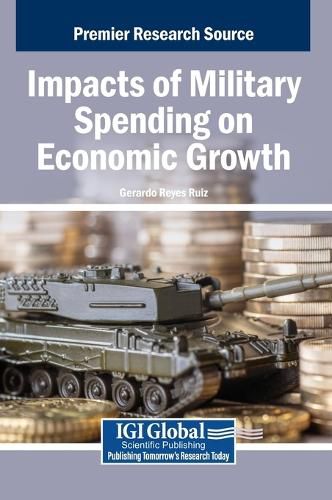Readings Newsletter
Become a Readings Member to make your shopping experience even easier.
Sign in or sign up for free!
You’re not far away from qualifying for FREE standard shipping within Australia
You’ve qualified for FREE standard shipping within Australia
The cart is loading…






This title is printed to order. This book may have been self-published. If so, we cannot guarantee the quality of the content. In the main most books will have gone through the editing process however some may not. We therefore suggest that you be aware of this before ordering this book. If in doubt check either the author or publisher’s details as we are unable to accept any returns unless they are faulty. Please contact us if you have any questions.
Military spending is continually debated in relation to its impact on economic growth. Proponents argue that defense spending increases economic activity by creating jobs, driving technological innovation, and boosting demand in industries. Critics cite excessive military spending diverts resources away from critical sectors like healthcare, education, and infrastructure, potentially hindering long-term economic development. The actual impact often depends on a country's economic structure, level of development, and efficiency in allocating defense resources. Understanding the relationship between military spending and economic growth is crucial for policymakers aiming to strike a balance between national security and sustainable economic progress. Impacts of Military Spending on Economic Growth explores how regional economic growth is affected by military, defense, and security spending, as well as the causes, benefits, and strategies associated with economic development. It examines current issues, challenges, and variables for the creation of new economic models and theories to strengthen available knowledge and research. This book covers topics such as human capital, national security, and econometric models, and is a useful resource for business owners, military members, economists, government professionals, academicians, researchers, and political scientists.
$9.00 standard shipping within Australia
FREE standard shipping within Australia for orders over $100.00
Express & International shipping calculated at checkout
This title is printed to order. This book may have been self-published. If so, we cannot guarantee the quality of the content. In the main most books will have gone through the editing process however some may not. We therefore suggest that you be aware of this before ordering this book. If in doubt check either the author or publisher’s details as we are unable to accept any returns unless they are faulty. Please contact us if you have any questions.
Military spending is continually debated in relation to its impact on economic growth. Proponents argue that defense spending increases economic activity by creating jobs, driving technological innovation, and boosting demand in industries. Critics cite excessive military spending diverts resources away from critical sectors like healthcare, education, and infrastructure, potentially hindering long-term economic development. The actual impact often depends on a country's economic structure, level of development, and efficiency in allocating defense resources. Understanding the relationship between military spending and economic growth is crucial for policymakers aiming to strike a balance between national security and sustainable economic progress. Impacts of Military Spending on Economic Growth explores how regional economic growth is affected by military, defense, and security spending, as well as the causes, benefits, and strategies associated with economic development. It examines current issues, challenges, and variables for the creation of new economic models and theories to strengthen available knowledge and research. This book covers topics such as human capital, national security, and econometric models, and is a useful resource for business owners, military members, economists, government professionals, academicians, researchers, and political scientists.